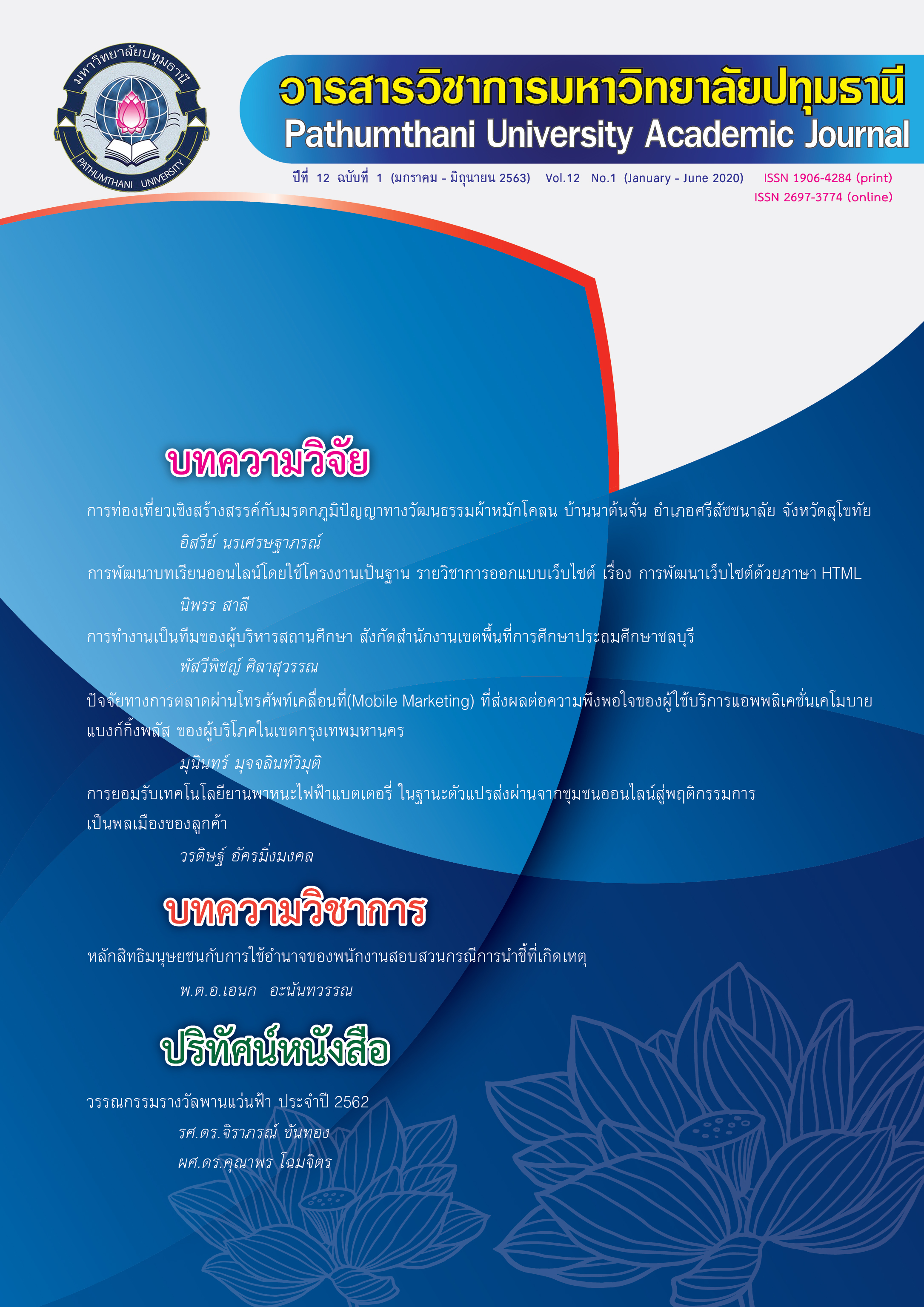ความสัมพันธ์ระหว่างการควบคุมตนเอง บุคลิกภาพห้าองค์ประกอบ บรรยากาศองค์การ กับพฤติกรรมการเป็นสมาชิกที่ดีขององค์การ ของบุคลากร ในองค์การแห่งหนึ่ง จังหวัดสมุทรปราการ
คำสำคัญ:
การควบคุมตนเอง, บุคลิกภาพห้าองค์ประกอบ, บรรยากาศองค์การ, พฤติกรรมการเป็นสมาชิกที่ดีขององค์การบทคัดย่อ
การวิจัยครั้งนี้มีวัตถุประสงค์ คือ 1) เพื่อศึกษาระดับ การควบคุมตนเอง บุคลิกภาพห้าองค์ประกอบ บรรยากาศองค์การ และพฤติกรรมการเป็นสมาชิกที่ดีขององค์การ ของบุคลากรในองค์การแห่งหนึ่ง จังหวัดสมุทรปราการ 2) เพื่อศึกษาความสัมพันธ์ระหว่างการควบคุมตนเอง บุคลิกภาพห้าองค์ประกอบ บรรยากาศองค์การ กับพฤติกรรมการเป็นสมาชิกที่ดีขององค์การ ของบุคลากรในองค์การแห่งหนึ่ง จังหวัดสมุทรปราการ 3) เพื่อศึกษาอำนาจการทำนายพฤติกรรมการเป็นสมาชิกที่ดีขององค์การ ของบุคลากรในองค์การแห่งหนึ่ง จังหวัดสมุทรปราการ จากการควบคุมตนเอง บุคลิกภาพห้าองค์ประกอบ และบรรยากาศองค์การ อย่างน้อย 1 ตัวแปร กลุ่มตัวอย่าง คือ บุคลากรระดับหัวหน้างาน ในองค์การแห่งหนึ่ง จังหวัดสมุทรปราการ จำนวน 100 คน เครื่องมือที่ใช้ในการวิจัยครั้งนี้ ประกอบด้วยแบบสอบถามข้อมูลทั่วไปเกี่ยวกับการควบคุมตนเอง บุคลิกภาพห้าองค์ประกอบ บรรยากาศองค์การ และพฤติกรรมการเป็นสมาชิกที่ดีขององค์การ สถิติที่ใช้ในการวิจัยครั้งนี้ คือ ค่าร้อยละ ค่าเฉลี่ย ค่าส่วนเบี่ยงเบนมาตรฐาน การวิเคราะห์สัมประสิทธิ์สหสัมพันธ์ของเพียร์สัน การวิเคราะห์การถดถอยพหุคูณ ผลการวิจัยดังนี้ 1.บุคลากรที่เป็นกลุ่มตัวอย่างมีค่าเฉลี่ยของพฤติกรรมการเป็นสมาชิกที่ดีขององค์การโดยรวมอยู่ใน ระดับสูง ของระดับการควบคุมตนเองโดยรวมอยู่ในระดับปานกลาง ของระดับบุคลิกภาพห้าองค์ประกอบโดยรวมอยู่ในระดับสูง ของระดับบรรยากาศองค์การโดยรวมอยู่ในระดับดีปานกลาง 2.การควบคุมตนเอง บุคลิกภาพห้าองค์ประกอบ บรรยากาศองค์การ มีความสัมพันธ์กับพฤติกรรมการเป็นสมาชิกที่ดีขององค์การอย่างมีนัยสำคัญทางสถิติที่ระดับ .01 3.การควบคุมตนเอง บุคลิกภาพห้าองค์ประกอบ และบรรยากาศองค์การ ซึ่งตัวแปรทั้งหมดสามารถร่วมกันทำนายพฤติกรรมการเป็นสมาชิกที่ดีขององค์การได้อย่างมีนัยสำคัญทางสถิติที่ระดับ .05
เอกสารอ้างอิง
จารุนันท์ ฤทธิบันลือ. (2557). ความเชื่ออำนาจตน ค่านิยมการทำงาน คุณภาพชีวิตการทำงาน และพฤติกรรมการเป็นสมาชิกที่ดีในองค์การ : กรณีศึกษานักรังสีเทคนิค ประจำโรงพยาบาลในกรุงเทพมหานคร. วิทยานิพนธ์ปริญญาศิลปศาสตรมหาบัณฑิต. มหาวิทยาลัยธรรมศาสตร์.
จิตติณี เกตุจุมพล. (2554). ความสัมพันธ์ระหว่างบุคลิกภาพ ความเชื่อในการควบคุม และพฤติกรรมการเป็นสมาชิกที่ดีขององค์การของพนักงานบริษัทโทรคมนาคม. วิทยานิพนธ์ปริญญาวิทยาศาสตรมหาบัณฑิต. มหาวิทยาลัยเกษตรศาสตร์.
ชูชัย สมิทธิไกร. (2550). การสรรหา การคัดเลือก และการประเมินผลการปฏิบัติงานของบุคลากร. กรุงเทพมหานคร : สำนักพิมพ์แห่งจุฬาลงกรณ์มหาวิทยาลัย.
ชญารัศมิ์ ทรัพยรัตน์. (2556).“พฤติกรรมการเป็นสมาชิกที่ดีขององค์การกับผลลัพธ์ที่เกิดขึ้น.” วารสารศึกษาศาสตร์. ปีที่ 7 ฉบับที่ 1.
พรเทพ แก้วเชื้อ. (2560). “พฤติกรรมการเป็นสมาชิกที่ดีขององค์การในประเทศไทย.” วารสารวิชาการมหาวิทยาลัยปทุมธานี. ปีที่ 9 ฉบับที่ 1.
เมตตา คงหอม. (2555). ความสัมพันธ์ระหว่างบุคลิกภาพตระหนักในหน้าที่รับผิดชอบบรรยากาศองค์การกับพฤติกรรมการเป็นสมาชิกที่ดีขององค์การของพนักงานบริษัทในเครือกลุ่มเจริญสิน. วิทยานิพนธ์ปริญญาวิทยาศาสตรมหาบัณฑิต. มหาวิทยาลัยรามคำแหง.
สมร พลศักดิ์. (2550). บุคลิกภาพ วัฒนธรรมองค์การ และพฤติกรรมการเป็นสมาชิกที่ดีของ องค์การ ของพนักงานโรงงานอิเล็กทรอนิกส์แห่งหนึ่ง. วิทยานิพนธ์ปริญญาวิทยาศาสตรมหาบัณฑิต. มหาวิทยาลัยเกษตรศาสตร์.
สฎายุ ธีระวณิชตระกูล. (2547). “การส่งเสริมพฤติกรรมการเป็นสมาชิกที่ดีต่อองค์การสู่การพัฒนาทรัพยากรมนุษย์ในองค์การอย่างยั่งยืน”. วารสารศึกษาศาสตร์. ปีที่ 16 ฉบับที่ 1.
สุจิตรา เกษสุวรรณ์. (2550). ความสัมพันธ์ระหว่างลักษณะบุคลิกภาพ ความพึงพอใจในงาน และพฤติกรรมการเป็นสมาชิกที่ดีขององค์การ : กรณีศึกษาบริษัทแอดวานซ์ อินโฟร์ เซอร์วิส จำกัด (มหาชน). สารนิพนธ์ปริญญาวิทยาศาสตรมหาบัณฑิต. มหาวิทยาลัยเชียงใหม่.
Costa, P. T. Jr., & McCrae, R. R. (2000). Revised NED personality (NEO-PI-R) and NEO five-factor for inventory (NEO-FFI) professional manual. Odessa, FL : Psychological Assessment Resources.
Likert, R., & Likert,. J. (1976). New way of management conflict. New York: McGraw-Hill.
Organ, D. W., & Lingl, A. (1995). “Personality, satisfaction and organization citizenship behaviour.” Journal of Social Psychology. 135.
Thoreson, C. E., & Mahoney, M. J. (1974). Behaviour self-control. New York: Holt, Rinehart Winston.
Yamane, T. (1973). Statistics: An introductory analysis. (3rd ed.). New York: Harper & Row.
ดาวน์โหลด
เผยแพร่แล้ว
รูปแบบการอ้างอิง
ฉบับ
ประเภทบทความ
สัญญาอนุญาต
บทความที่ได้รับการตีพิมพ์เป็นลิขสิทธิ์ของวารสารมหาวิทยาลัยปทุมธานี
ข้อความที่ปรากฎในบทความแต่ละเรื่อง เป็นความคิดเห็นส่วนตัวของผู้เขียน กองบรรณาธิการไม่จำเป็นต้องเห็นด้วยเสมอไป และไม่มีส่วนรับผิดชอบใด ๆ ถือเป็นความรับผิดชอบของผู้เขียนแต่เพียงผู้เดียว



